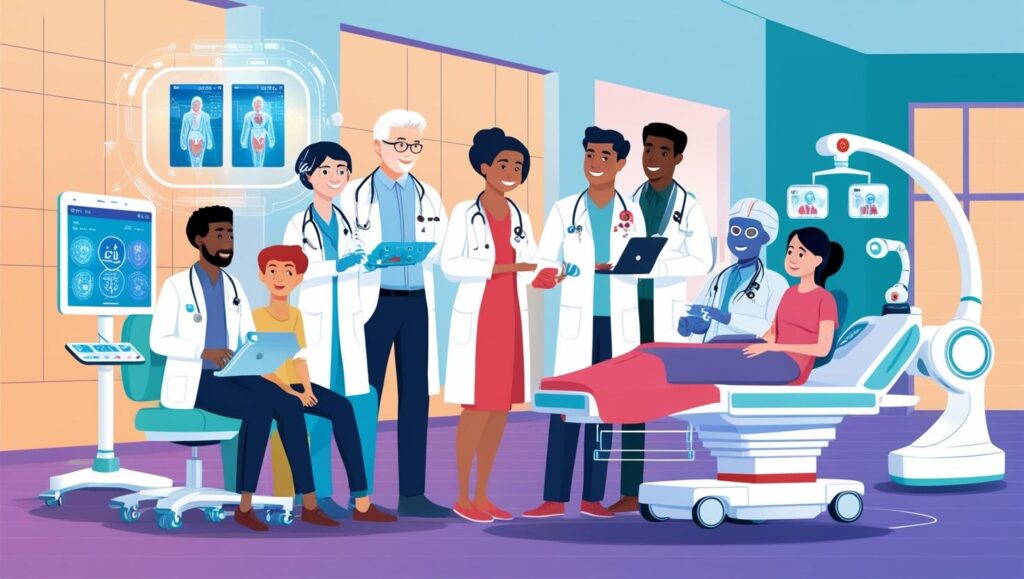
AI’s Transformative Impact on Healthcare
Artificial intelligence (AI) is revolutionizing the healthcare industry, offering unprecedented opportunities to enhance patient care, improve diagnostics, streamline treatment plans, and optimize administrative processes. By leveraging its ability to analyze vast datasets and identify complex patterns, AI is poised to minimize errors, predict health issues, and ultimately improve patient outcomes while driving efficiency across the healthcare ecosystem.
How AI is Transforming Healthcare
AI is being integrated into nearly every facet of patient care and medical research, enabling more accurate diagnoses, personalized treatment plans, and better health outcomes. Its ability to rapidly process and analyze clinical data allows medical professionals to identify disease markers and trends with remarkable speed and precision. From evaluating radiological images for early detection of conditions to predicting patient outcomes using electronic health records, AI is empowering clinicians with data-driven insights that were previously unattainable.
1. Clinical Decision Support
AI and machine learning are reshaping the clinical decision-making process. By processing vast amounts of data more efficiently than traditional tools, AI provides stakeholders with granular insights that can significantly enhance decision-making. This capability is particularly valuable in complex cases where human expertise alone may fall short.
2. Diagnosis and Treatment
AI has the potential to revolutionize diagnostics and treatment analysis. Machine learning algorithms can uncover patterns and correlations in patient data that are often invisible to human experts. This enables more accurate and timely diagnoses, as well as personalized treatment plans tailored to each patient’s unique characteristics. Additionally, AI tools can assess the effectiveness of treatments in real-time, suggesting adjustments that improve clinical outcomes and reduce healthcare costs.
3. Enhancing the Patient Experience
AI is also improving the patient experience by streamlining processes such as appointment scheduling, remote monitoring, and personalized care delivery. Chatbots, for instance, can handle routine medical inquiries and guide patients on when to seek professional care, reducing stress and saving time for both patients and providers.
The Positive Impact of AI in Healthcare
The integration of AI into healthcare brings numerous benefits, including increased accuracy, efficiency, and the ability to deliver personalized care.
1. Improved Accuracy
AI models have demonstrated remarkable diagnostic accuracy. For example, in diagnosing the BRAF V600E mutation in colorectal carcinomas, an AI model achieved a 93.8% accuracy rate. Similarly, during the COVID-19 pandemic, an AI system developed by researchers accurately diagnosed novel coronavirus pneumonia (NCP) with 92.49% accuracy, 94.93% sensitivity, and 91.13% specificity.
2. Enhanced Efficiency
AI automates repetitive administrative tasks, freeing up medical professionals to focus on patient care. It can also identify rare symptoms or bacterial strains much faster than traditional methods, significantly speeding up the diagnostic process.
3. Personalized Care
AI and machine learning are enabling providers to deliver more personalized medical treatments. By unlocking and analyzing data that was previously used for basic decision-making, AI allows for deeper insights and the identification of associations that the human brain might miss. This leads to more tailored and effective care for patients.
Concerns and Considerations
Despite its many advantages, the implementation of AI in healthcare is not without challenges. Potential concerns include:
- Data Security: The increased reliance on AI raises the risk of data breaches, necessitating robust cybersecurity measures.
- Clinical Implementation: Integrating AI into existing healthcare systems requires careful planning and training to ensure seamless adoption.
- Ethical Dilemmas: The use of AI in healthcare raises ethical questions, such as accountability for errors and the potential for bias in algorithms.
It is crucial to weigh these risks against the benefits when implementing AI tools in healthcare.
The Future of AI in Healthcare
AI is set to become a cornerstone of the future medical landscape. As the technology continues to advance, its applications in healthcare will become even more diverse and impactful. From optimizing diagnostics and treatment planning to automating administrative tasks, AI has the potential to transform the industry, improving patient outcomes and operational efficiency.
The growing adoption of AI in healthcare is already making a difference for both providers and patients. By harnessing its power, healthcare systems can deliver faster, more accurate, and more personalized care, ultimately creating a healthier world.
Conclusion
AI is undeniably reshaping healthcare, offering solutions that enhance accuracy, efficiency, and patient care. While challenges remain, the potential benefits far outweigh the risks, positioning AI as a transformative force in the industry. As we move forward, the continued development and responsible implementation of AI will be key to unlocking its full potential and ensuring a brighter future for healthcare.
Citations:
[1] https://www.bostondigital.com/insights/impact-artificial-intelligence-healthcare
[2] https://pmc.ncbi.nlm.nih.gov/articles/PMC10804900/
[3] https://onlinedegrees.sandiego.edu/ai-healthcare/
[4] https://www.thomsonreuters.com/en-us/posts/technology/ai-usage-healthcare/
[5] https://www.lapu.edu/ai-health-care-industry/
[6] https://www.techtarget.com/healthtechanalytics/feature/Top-12-ways-artificial-intelligence-will-impact-healthcare
[7] https://hsph.harvard.edu/news/how-artificial-intelligence-might-help-health-care-or-harm-it/